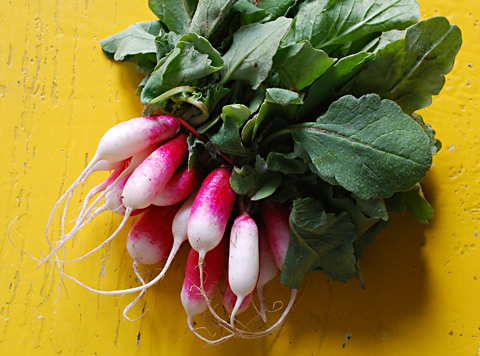These long summer days have been great for getting all the work done at the Big Red Farm. I am happy to report that, in spite of a fairly cool spring, most of the classic summer veggies (tomatoes, basil, carrots, beets, peppers, eggplants) are out in the field and growing quickly. Meanwhile, we're still picking lots of beautiful spring lettuce, along with kale, rainbow chard, scallions, radishes, and kohlrabi.
So, stop by the farmstand tomorrow in front of Pop Hall for some freshly-harvested local veggies. And if you happen to eat at Wildflour Bakery this week, you'll have a chance to sample some Big Red Farm produce there, as well. The folks at Wildflour have been terrific supporters of the farm and we really appreciate it.
ON THE FARM
One recent morning we looked out at our beautiful rows of potatoes (planted by the young men of Woodhull back in May) and noticed some minor leaf damage. A closer inspection confirmed our fears: the Colorado potato beetles had arrived. When you spend a whole growing season moving the sheep in temporary paddocks around a field to build up soil fertility for next year's crop, and then you carefully select potato varieties from the seed catalog during the long winter evenings, and then you spend hours working up the ground with various tractor-mounted implements, and then you carefully plant out the seed potatoes with the help of Woodhull's finest -- well, you are apt to lose all patience with a pest that threatens to destroy everything you have worked for.
 |
| Potato beetles on the Big Red Farm, with a ladybug in the foreground. Ladybugs will eat the potato beetle larvae, so we like them. |
 |
| Eventually we learned to wear latex gloves. |
RECIPES
 |
| French Breakfast radishes |
This week, we offer a small celebration of a simple spring delight. I had always assumed that "French Breakfast" radishes were no more French than fries, so imagine my surprise when two of Lawrenceville's French teachers came to the farmstand last week and asked specifically for these crunchy red gems. I gather that the classic way to enjoy these radishes is to slice them thinly and lay them across buttered bread, and then to serve them as hors d'oeuvres with champagne. But you can find a nice variation here: {Radishes with Butter}
Also, since the kale is still looking great and growing abundantly, here is a delicious kale salad (which also includes radishes, appropriately enough) which makes frequent appearances on our table, regardless of the season. {Kale Salad with Cherries and Pecans}
AT THE FARM STAND
This week, we hope to have the following available from 1pm to 5pm in front of Edith Chapel:
- Eggs - $5.00 dozen
- Flowers - $5.00 bouquet
- Garlic Scapes - 3/$1.00
- Kale - $2.50 bunch
- Kohlrabi - $1.00 each
- Lettuce - $2.50 head
- Radishes - $2.00 bunch
- Rainbow Chard - $2.50 bunch
- Scallions - $1.50 bunch
- Shell peas - $3.00 quart
- Snap peas - $2.50 pint
HOW TO FIND US:
This week we'll be right in front of Pop Hall, at the top of the stairs that lead down into the Bowl. Enter campus by the main gate on Route 206 (opposite the Lawrenceville Post Office and Craven Lane) and bear right into the circle. Bear right again at the fork in the road and continue straight until you see the farmstand signs.
.JPG)
No comments:
Post a Comment